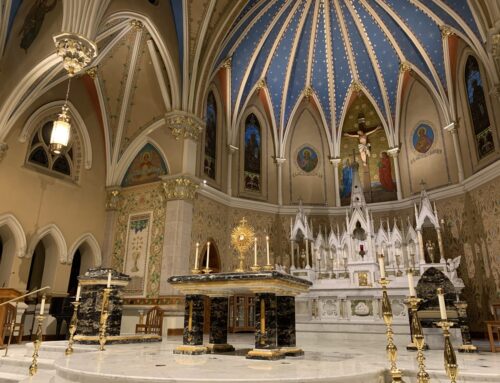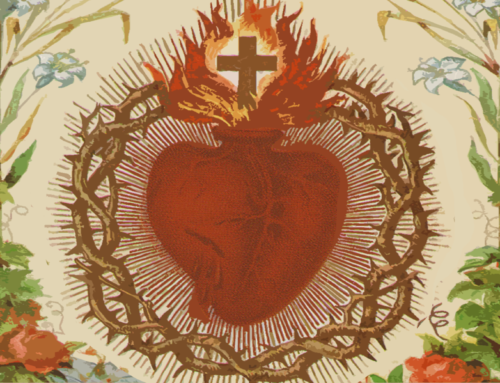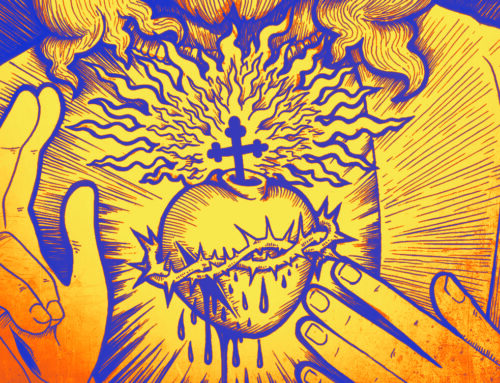Readings for Tuesday of the 32nd Week in Ordinary Time
They seemed in the view of the foolish, to be dead; and their passing away was thought an affliction — and their going forth from us, utter destruction. But they are in peace. (Wisdom 3:2-3)
This passage from the book of Wisdom, very often chosen for funerals, gives us a glimpse into an apparent-paradox of our Catholic faith: That death is both the just consequence for our sin, and simultaneously the passageway into immortal and divine life with God. In other words, death isn’t something to be dreaded, so much as entered into. Death is the curse of our fallen nature, but at the same time, it is a tremendous gift.
How can we possibly wrap our heads around this mystery?
Well… if you’ll indulge me, perhaps Lord of the Rings can help us. For any fellow-nerds out there, you might remember that the Elves of Middle-earth are immortal. They can go on living endlessly for thousands and thousands of years, and they never grow old and frail. It seems like a great gig at first, and yet — in Tolkien’s mythology — they envy the mortality of men! Benedict XVI once said:
To continue living for ever —endlessly—appears more like a curse than a gift. To live always, without end—this, all things considered, can only be monotonous and ultimately unbearable. (Spe Salvi #10)
Tolkien himself even suggests that the “God” character in his storyline actually gave Death to mankind as a gift — as a way for them to pass out of the sad suffering of Middle-earth and eventually come to be with their ancestors forever in the so-called ‘Undying Lands.’
This probably strikes us as strange and perhaps even a little insensitive — Why would we ever treat death as a gift? It causes us so much pain, so much loneliness, so much separation, and often enough — so much fear. Death as a gift? What is JRR Tolkien even ‘tolkien’ about?
Well, all this nerd-speak is echoed, oddly enough, in our Catholic Tradition. St. Ambrose has this to say about our topic:
Death is, then, no cause for mourning, for it is the cause of mankind’s salvation…God did not decree death from the beginning; he prescribed it as a remedy. Therefore, we should have a daily familiarity with death, a daily desire for death.
This is in perfect agreement with our reading from Wisdom: “Their passing away was thought an affliction — and their going forth from us, utter destruction. But they are in peace.”
GK Chesterton put it in this shocking terms:
The early Christian martyrs talked of death with a horrible happiness. They smelt the grave afar off like a field of flowers.
What both Ambrose and Chesterton are describing is, of course, the wonderful fact that one definitive death destroyed death itself, namely — in dying, Jesus undid the deadliness of death. And thus, through His one sacrifice, Death did become a kind of gift. Despite all the pain, the difficulty, the grief, death is a gift that we can fearlessly prepare for in the firm hope of Resurrection.
So I guess my question is this: Do we see Death as a kind of mercy from God? Do we, in a sense, long for this life to end, even as we fully embrace and appreciate our time here below? Or do we instead think we’re like the Elves… Do we kind of trick ourselves into believing that this life will go on endlessly? Our culture seems bent on doing so, with its feverish desire to avoid death at all costs — choosing instead the comforts this present life can offer: wealth, health, honor, pleasure, etc.
But this will all end. Even if we happen to be the generation that finally sees Jesus return again in full power from Heaven — this old-world must still give way to the new — this life must change, must put on immortality. Each one of us will have to loosen our grip on life as we know it. And then we can embrace our own death as a gift — our means to enter into the perfect peace of God.





Thank you for leading me to your web page. I will enjoy this to read weekly.